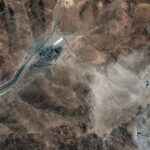In addition to the devastating loss of life and suffering, Israel’s war against Hamas and Hezbollah militant groups is also extraordinarily expensive. These painfully high financial costs have raised concerns about the long-term impact of the war on the country’s economy.
According to the Associated Press, military spending has surged, and economic growth has stalled, especially in the dangerous border areas that have been evacuated. Economists warn that as the war strains the government budget, Israel may face declining investment, rising taxes, and difficult choices between social programs and military spending.
According to the Stockholm International Peace Research Institute, Israel’s monthly military expenditure increased from $1.8 billion before Hamas attacked Israel on October 7, 2023, to about $4.7 billion by the end of last year.
The latest data from the institute shows that Israel’s military spending last year was $27.5 billion, ranking 15th globally, behind Poland but ahead of Canada and Spain, even though those countries have larger populations. Military spending accounted for 5.3% of Israel’s annual economic output, compared with 3.4% in the United States and 1.5% in Germany. In contrast, Ukraine’s military spending dwarfs Israel’s, with Ukraine dedicating 37% of its GDP and over half of its government budget to military expenses in its defense against Russia’s invasion.
In the three months following the Hamas attack, Israel’s economic output shrank by 5.6%, the worst performance among the 38 member countries of the Organization for Economic Cooperation and Development (OECD).
Earlier this year, the economy partially rebounded, growing by 4%, but the second quarter saw only a 0.2% increase.
The war has dealt a greater blow to Gaza’s already devastated economy, displacing 90% of the population and leaving the vast majority of the workforce unemployed. The economy of the West Bank has also been severely impacted, with tens of thousands of Palestinian workers losing their jobs in Israel after October 7, while Israeli military raids and checkpoints have restricted movement.
In Israel, the war has added numerous economic burdens. Military conscription and extended service may reduce labor supply. Security concerns have hindered new business investment, and disrupted flights have deterred many tourists, hurting the tourism sector.
At the same time, the government is providing housing for thousands of residents forced to leave areas near the Gaza border in the south and northern regions under Hezbollah’s fire threat.
One of the biggest concerns is the seemingly endless nature of the war, which has already lasted more than a year. Israel’s economy rebounded quickly after its 2006 war with Hezbollah in southern Lebanon, but that conflict lasted only 34 days.
Moody’s Ratings Agency cited this issue on September 27 when it downgraded Israel’s government credit rating by two levels. The Baa1 rating is still considered investment grade but with a higher risk.
However, Israel’s economy is far from collapsing. The country has a diversified, developed economy with a strong information technology sector that supports tax revenues and defense spending. Unemployment is low, and the TA-35 stock index has risen by 10.5% this year.
Even during the war, tech companies raised about $2.5 billion in funds during the third quarter, according to Zvi Eckstein, director of the Aaron Institute for Economic Policy at Reichman University.
Israel entered the war with a favorable government debt situation, with debt at 60% of GDP. That has now risen to 62%, but it remains lower than France’s 111% and is on par with Germany’s 63.5%.













Leave a comment